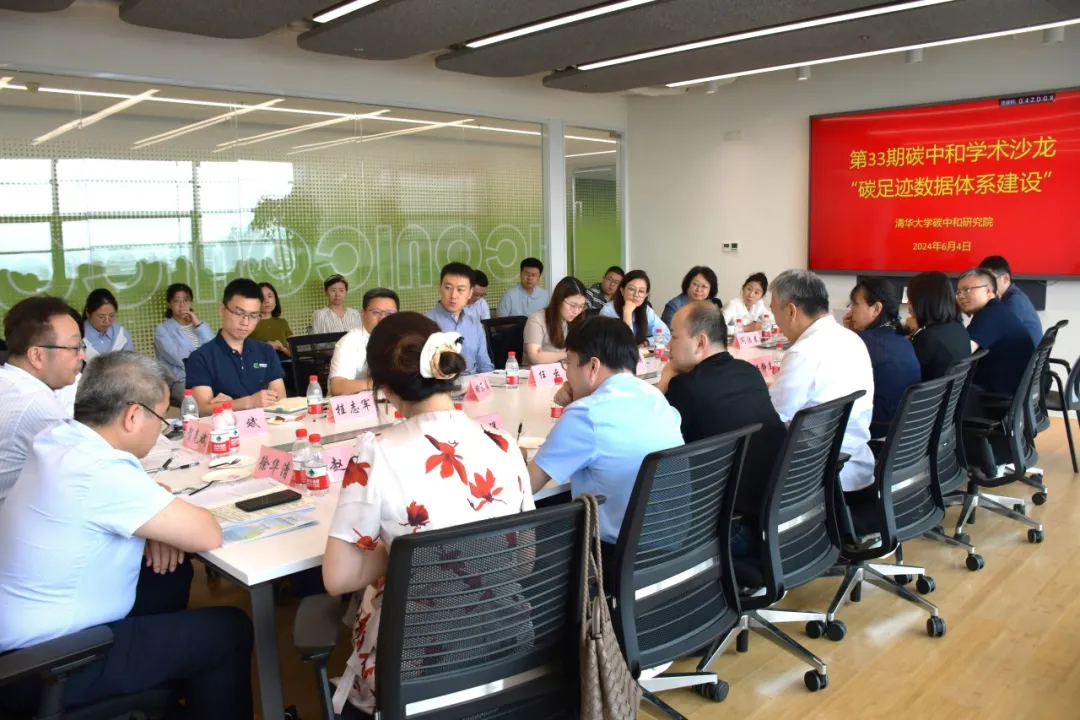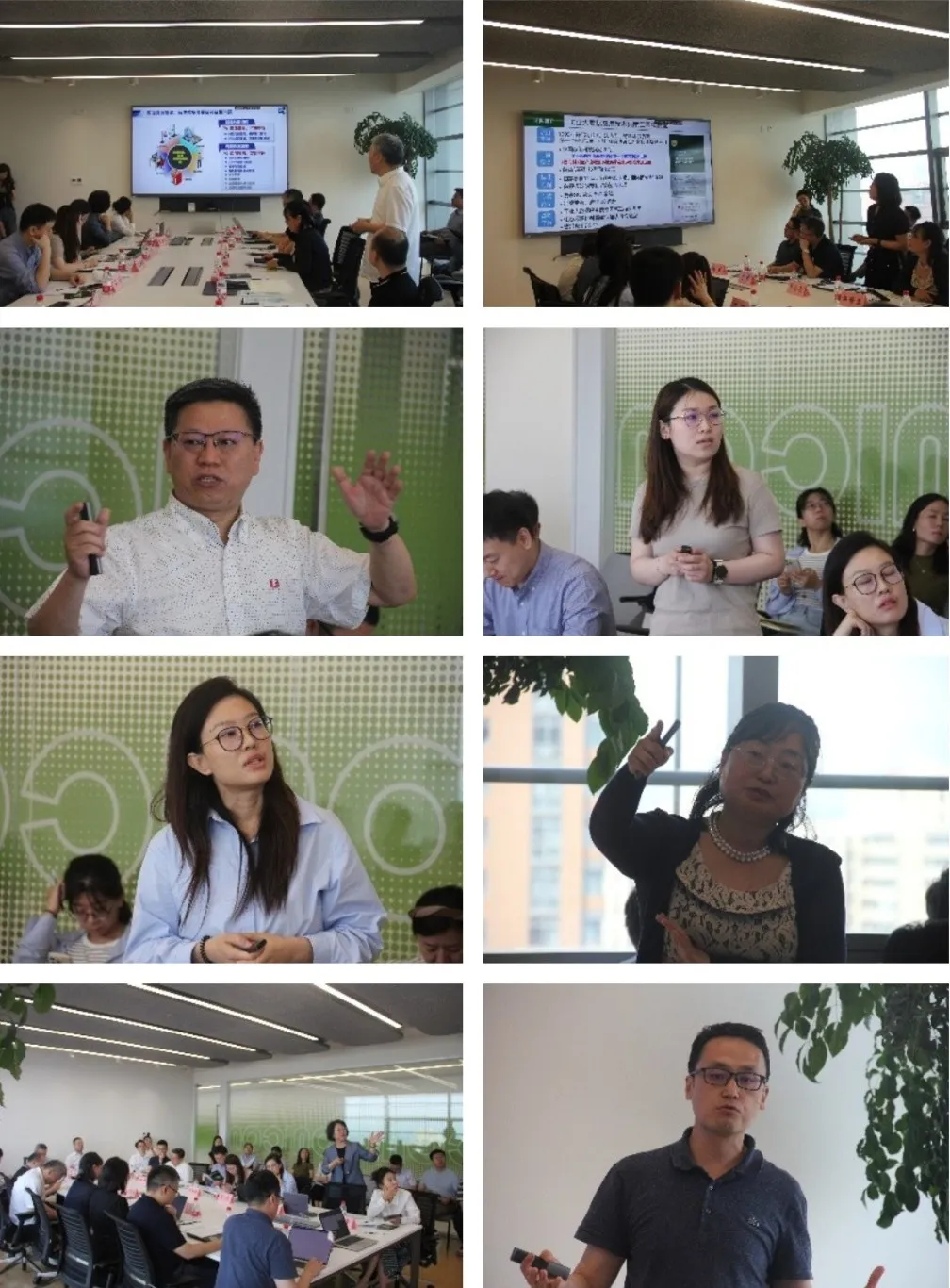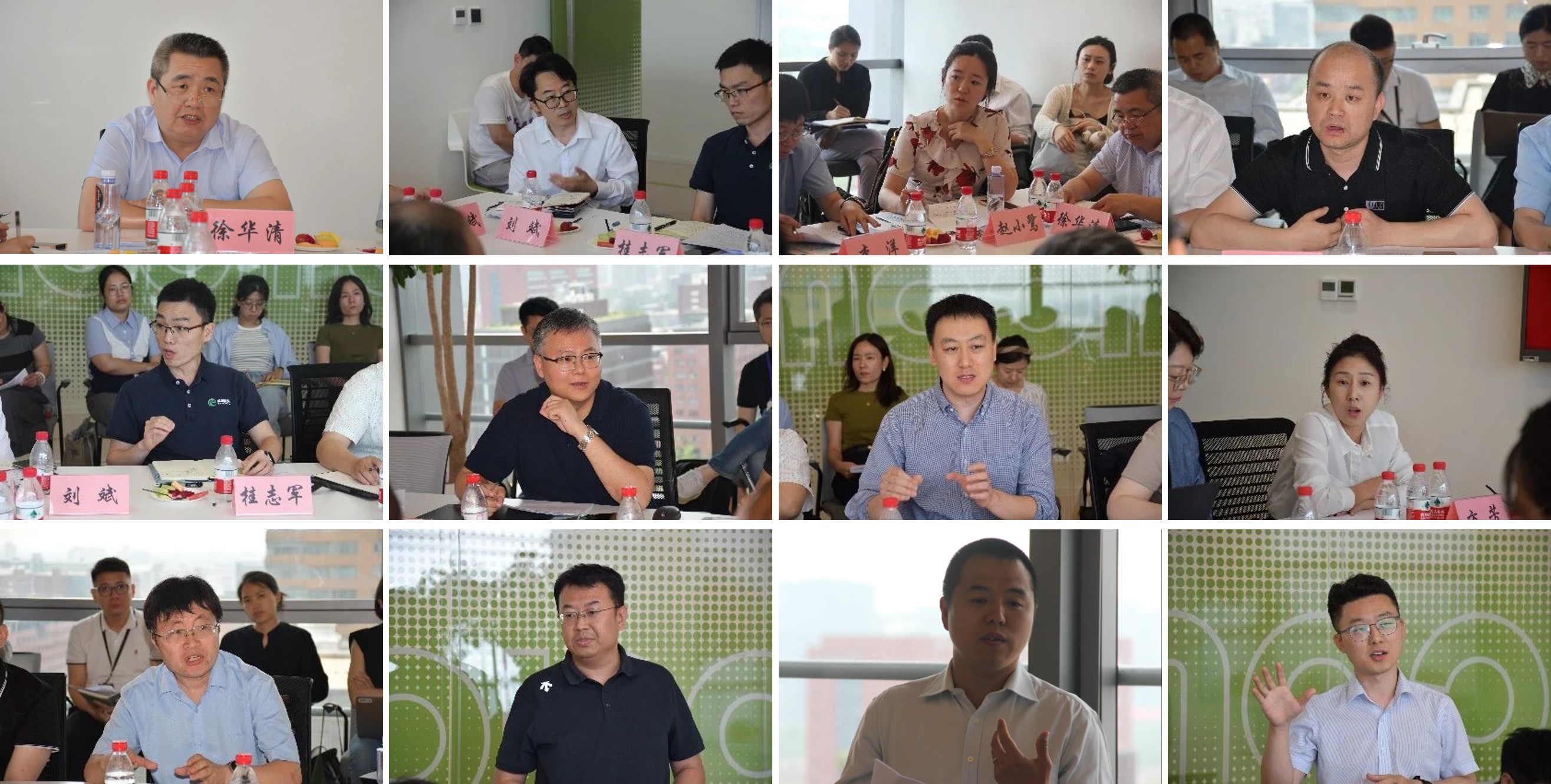On June 4th, 2024, the "33rd Academic Salon on Carbon Neutrality: Building a Carbon Footprint Data System" was successfully held, hosted by the Institute for Carbon Neutrality, Tsinghua University. The salon gathered over 40 experts and scholars from universities, research institutes, and enterprises to discuss the progress and direction of building a carbon footprint data system in China. They shared insights and provided recommendations on using data to empower carbon footprint management, contributing to the "dual carbon" goals. The salon was chaired by Xu Ming, Chair Professor of carbon neutrality and Associate Dean of the School of Environment, Tsinghua University.

33rd Academic Salon on Carbon Neutrality: Building a Carbon Footprint Data System
Academician Involvement
Experts and scholars engaged in discussions on building a carbon footprint data system
He Kebin, Academician of the Chinese Academy of Engineering, Dean of the Institute for Carbon Neutrality, and Professor at the School of Environment, Tsinghua University, delivered a keynote speech titled "On the Development of an Organized and Localized Product Carbon Footprint Accounting System in China." He detailed national policies on carbon emission accounting, carbon footprint management systems, and building databases for product carbon footprints in specific sectors. He also shared his thoughts and suggestions on constructing China's carbon footprint database. He pointed out that product carbon footprint standards are an important component of the overall design of the national "dual carbon" strategy. The key is to establish a localized list of activity levels with high temporal and spatial resolution and the corresponding emission factors.

Keynote speech by He Kebin
Researcher Cao Hongbin from the Institute of Process Engineering, Chinese Academy of Sciences, Assistant Researcher Li Xiaoqing from Beijing University of Technology, Researcher Tian Yajun from the Qingdao Institute of Bioenergy and Bioprocess Technology, Chinese Academy of Sciences, Researcher Zhu Shuying from the Chinese Academy of Environmental Planning, Associate Researcher Ding Ning from the Research Center for Eco-Environmental Sciences, Chinese Academy of Sciences, Professor Hong Jinglan from Shandong University, General Manager Yan Haochun from China Testing & Certification International Group/Certification Evaluation Center, and Professor Xu Ming from School of Environment, Tsinghua University, delivered keynote reports. They shared relevant research findings and practical experiences on building a carbon footprint data system.

Reports by attendees
Keynote Report
Cao Hongbin delivered a keynote report on "Construction and Application of Chemistry and Chemical Engineering Data Resources." He pointed out that industrial processes are characterized by complex raw materials, complicated steps, and multiple objectives. The trend of reducing pollution and carbon emissions through the integration of digital and intelligent technologies is emerging. However, in practice, this approach faces challenges related to the application and management of data resources. The Chemistry & Chemical Engineering Data Center of the Chinese Academy of Sciences aims to address issues of data quality and accessibility by establishing a series of data standards and specifications. It aims to build the largest foundational chemical database in China that can gradually replace existing ones. Finally, he provided a detailed introduction to the research on data-driven pollution and carbon reduction throughout the entire industrial production process, along with relevant case studies.
On behalf of the National Engineering Laboratory for Big Data Application Technology, Li Xiaoqing introduced the construction and application of the material life cycle assessment (LCA) foundational database. Li shared insights on data quality control methods, the development of data platforms, and the design and evaluation of eco-materials based on big data technology.
Tian Yajun discussed the construction of a high-spatial-resolution LCA database, focusing on the challenges, opportunities, scientific issues, and solutions involved. He introduced the background, concepts, and advantages of developing a Geographic Information System-based LCA (GIS-LCA) software. Tian also shared the origins and progress of the GIS-LCA.
Zhu Shuying delivered a keynote report - "Product Carbon Footprint Research and LCA Database Construction," analyzing the LCA data demand under the "dual carbon" goals and the progress of LCA databases both internationally and domestically. She emphasized that comprehensive carbon emission accounting is crucial but presents significant challenges. To support this, there is a need for a comprehensive, localized, accurate, and open-source LCA database. Next, she provided a detailed introduction to the establishment and application of the database of greenhouse gas emission factors for the entire lifecycle of Chinese products.
Ding Ning presented a special report titled "Carbon Footprint Data System Construction—LCA Database Assisting Green and Low-Carbon Industry Development." She introduced the history, construction objectives, data content, and application scenarios of the LCA database of the Research Center for Eco-Environmental Sciences, Chinese Academy of Sciences. Using the photovoltaic module eco-design database as an example, she explained how the database supports green industry development, enterprise energy saving and green development, and the carbon footprint studies of exported products.
Hong Jinglan shared content related to the construction of a precise quantification technology system for green carbon reduction. She summarized the main causes of inconsistencies in LCA evaluation results for the same object and, based on this, proposed the concept of constructing a precise quantification technology system for green carbon reduction. Subsequently, she introduced China's process-based foundational LCA database, CPLCID. She shared research progress in areas such as uncertainty analysis, LCI, the construction and validation of localized LCIA models, and comprehensive models for the ecological value of entire processes. She showcased the application of this database across various scenarios—micro, meso, and macro—and its support for rapid quantification and precise decision-making in green carbon reduction for China's industries.
Yan Haochun provided a detailed introduction to the background, achievements, promotion, application, challenges, and prospects of the CNCD, China's foundational database for the carbon footprint of industrial raw materials. She pointed out that at this stage, the initial product carbon footprint databases have been established for the steel, cement, petrochemical, chemical engineering, and electrolytic aluminum industries. The goal is to gradually improve China's local LCA data and, through continuous iteration and updates, establish a comprehensive LCA database for all industries in China that is recognized internationally.
Xu Ming presented a special report on "Insights for Building a Product Carbon Footprint Database," discussing the internal and external driving forces for establishing a product carbon footprint management system, the basic elements of carbon footprints, international carbon footprint/LCAdata systems, and existing well-known domestic and international databases. He proposed that there is an urgent need to establish an internationally recognized Chinese carbon footprint/LCA database. He emphasized that openness and transparency are crucial for China's database to gain international recognition and even achieve a "counterbalance". Subsequently, he provided a detailed introduction to the "three-step" plan and progress of the TianGong Database, an open and transparent Chinese carbon footprint/LCA database jointly developed and maintained by Tsinghua University and 42 other universities and research institutions. He highlighted its contributions to international data systems. Finally, he called for collective efforts to jointly build China's carbon footprint/LCA data system, fostering an open and transparent community. He urged active participation to ultimately lead the international development of carbon footprint/LCA systems.
Multilateral Participation
Attendees jointly discussed the future construction of the carbon footprint data system
Experts and scholars such as Xu Huaqing, Chief Scientist of the National Center for Climate Change Strategy and International Cooperation (NCSC); Liu Bin, Chief Expert of the China Automotive Technology and Research Center Co., Ltd (CATRC) and Deputy Director of the China Automotive Strategy and Policy Research Center; Zhao Xiaolu, Global Climate Director of the Environmental Defense Fund; Wang Hongtao, Director of the China Quality Certification Center (CQC); Gui Zhijun, Co-founder and Senior Vice President of E-C Digital; He Han, Low-carbon Product Manager at SGS China; Ren Yun, Brand PR Manager of APP China's Communications Department; Zhang Haibin, IT Director at Yangtze Delta Region Institute of Tsinghua University, Zhejiang; Fang Fang, Technology Director of China Huaneng Yangtze Environmental Protection Technology Co., Ltd; Li Yang, Technical Development Director of China Electrical Equipment Group Research Institute Co., Ltd.; Li Zhongyang, Director of the Energy Electronics Center at the Institute for Electronics and Information Technology, Tsinghua University, and CEO of TSINGROC.ai; Liu Zhi, Deputy Director of the Energy Chain Network Research Center at Tsinghua University’s Energy Internet Research Institute; Ma Hao and Shi Qinglin, representatives from State Grid Tianjin Electric Power Company's Dual Carbon Operation and Management Branch, were invited to participate in discussions and speeches. They engaged in in-depth exchanges regarding the construction of an interconnected data system featuring joint consultation and shared benefits, focusing on the concepts, methods, challenges, and other aspects.

Experts and scholars discuss and exchange ideas
Consensus Building
Promoting the construction of China's carbon footprint data system
The attending experts unanimously agreed that establishing an authoritative and transparent carbon footprint data system in China is of great significance for advancing the country's "dual carbon" goals. Academician He Kebin noted that both domestic and international policies are driving the rapid research on China's carbon footprint data system, especially due to the impact of international policies like the EU Batteries Regulation. He noted that scientists should understand the national realities, identify weak points, and provide recommendations. He suggested that efforts should combine professional and managerial perspectives to promote international mutual recognition of data. He advocated for actively exploring the creation of an interconnected, authoritative carbon footprint data platform featuring joint consultation and shared benefits. He emphasized that existing research lays a solid foundation for this data system and can serve as a "building block" for its construction.
This successful salon provided an important platform for exchange and cooperation to promote the construction of China's carbon footprint data system. It offered significant theoretical and practical support for China to achieve its "dual carbon" goals and helped enhance China's say and influence in the global carbon footprint management field.





